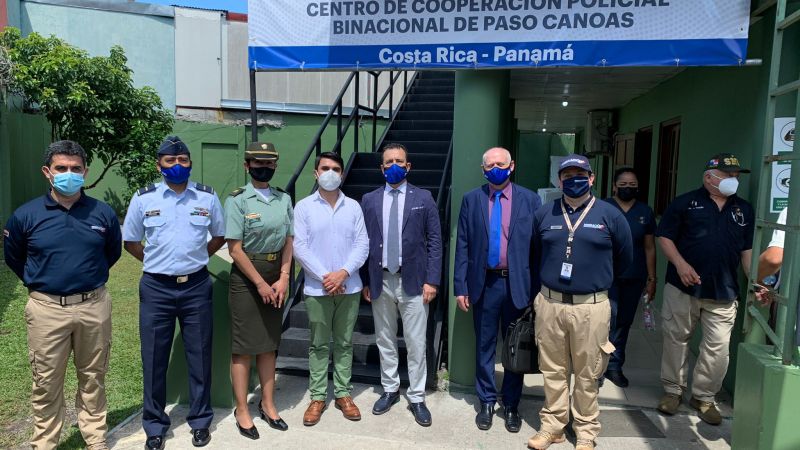News
Today we finished the study visit to the Bi-National Police Cooperation Centre in Paso Canoas between Costa Rica and Panama. Since 23 March, delegations from partner countries Colombia and Ecuador have witnessed the good practices implemented in Paso Canoas through experts working at the Rumichaca Border Crossing in order to adapt them to their respective territories.

The Paso Canoas Bi-National Police Cooperation Centre opened in June 2019 and has been developed following the European model. It currently comprises the agencies in charge of security in Panama and Costa Rica, having established mechanisms to work together through the exchange of data and information, coordinating mixed river and land police patrols, all within a legal framework of respect for human rights and sovereignty of both states.
Panama and Costa Rica have been the pioneering countries in the region in addressing border coordination and cooperation as a strategic guideline to combat cross-border crime, a task that has been supported by the European Union’s EL PAcCTO programme, led jointly by FIIAPP and by Expertise France with the collaboration of the IILA and the Camoes Institute, which has undertaken to accompany the implementation of the centre.
The visit was attended by the political, police and customs authorities of Panama and Costa Rica, the Delegation of the European Union, representatives of the Ministry of Foreign Affairs, the Interior Ministry, the Colombian and Ecuadorian Ministries of Defence, and FIIAPP staff who work on and coordinate the EUROFRONT programme.
Over these three days, specialists from the border crossings of Panama and Costa Rica were able to study various examples of border cooperation between France and Spain. They also had the opportunity to learn how cross-border surveillance and pursuits are carried out at a European level, as well as the readmission of foreign nationals with irregular status. Finally, there was an exchange of knowledge between European and Latin American specialists regarding the creation and coordination of mixed land and river police patrols. Meanwhile, the Paso de Canoas Police centre shared information on its technical external and internal communication resources, computer resources and its operation.
In short, this study visit has allowed the EUROFRONT partner countries, Ecuador and Colombia, to observe how to cooperate, collaborate and coordinate actions on the ground with the neighbouring country and how, the procedures and methodology of work have to adapt to jointly manage the dangers and threats that exist on similar borders. This will allow experts from Ecuador and Colombia to identify the common measures, problems and solutions that they have faced at Pasos Canoas and that can serve as a reference for the implementation of measures at the Rumichaca border crossing.
Line of action
Social media news

